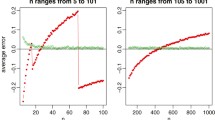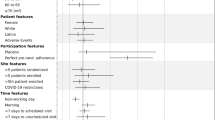Abstract
The planning and execution of clinical trials utilizing response-adaptive randomization is logistically complex. While a standardized approach to such designs is worthwhile, there are also unique challenges with each trial. Three detailed case studies are provided to illustrate the types of logistical issues that arise, as well as the decision problems coming before the data monitoring committees. Several lessons learned from these case studies are presented. These range from consideration of more extreme scenarios for trial simulation during the planning stage to formal establishment of an executive steering committee to facilitate the decision process (even for learn-phase trials).
Similar content being viewed by others
References
Fardipour P, Littman C, Burns D. et al. Planning and executing response-adaptive learn-phase clinical trials: 1. The process. Drug Inf J 2009;43:713–723.
Author information
Authors and Affiliations
Corresponding author
Rights and permissions
About this article
Cite this article
Fardipour, P., Littman, G., Burns, D.D. et al. Planning and Executing Response-Adaptive Learn-Phase Clinical Trials: 2. Case Studies. Ther Innov Regul Sci 43, 725–734 (2009). https://doi.org/10.1177/009286150904300610
Received:
Accepted:
Published:
Issue Date:
DOI: https://doi.org/10.1177/009286150904300610




